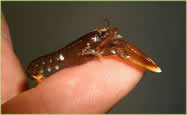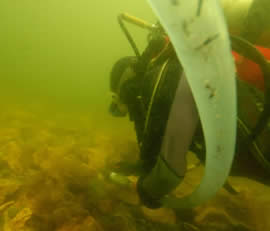Genetic Fingerprinting Techniques For Lobster Seeding Trials (NOAA/Sea Grant)
Developing Genetic Fingerprinting Techniques For Lobster Seeding Trials
Participants: R. Wahle (UMaine), G. Gerlach (Univ. Oldenberg), D. Towle (Mt. Desert Is. Biol. Lab.), T. Ames (Penobscot East Resource Center)
Funding Agency: NOAA/Sea Grant
Funding Period: 2008-2010
Project Summary:



The project objectives are to (1) Assess the local impact of releases of stage V+ lobsters at release sites relative to unseeded control sites, and (2) Develop and apply genetic fingerprinting methods to distinguish hatchery-reared from wild stock in field collections. The approach integrates the development of genetic fingerprinting methodology within a Before-After-Control-Impact (BACI) study whereby seeded experimental and unseeded control sites are established in Maine’s Lobster Zone C. The Zone C Hatchery will raise and release juvenile lobsters at selected study sites currently under study. Diver-based surveys conducted by Bigelow Laboratory are designed to track the fate of cohorts through time at our study sites. Lobster genetic fingerprinting analysis will be carried out by collaborators at Mt. Desert Island Biological Lab and the University of Oldenberg (Germany) to distinguish hatchery-reared from wild stock in diver collections using state-of-the-art techniques and facilities. Outreach to industry, fishery managers, and community is planned by Penobscot East Resource Center. Our project is spearheaded by the fishing community; it addresses the sustainable management and enhancement of a critical resource for much of Maine, to say nothing of New England and Maritime Canada. And regardless of where one stands on the continuing debate over the efficacy of fishery enhancement, there is little doubt that the development of methods to assess it is long overdue. The project is therefore consistent with cross-cutting issues guiding Maine Sea Grant’s Strategic Plan.
